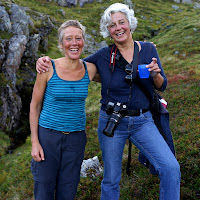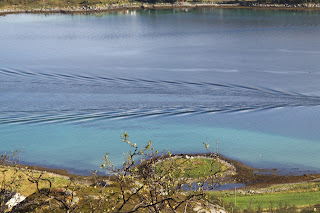I have long been fascinated by the lightscape of reflections and have hung a couple of exhibitions depicting Oxford variously reflected and refracted, my aim being to create awareness through surprise, to see things new rather than see new things. The biggest surprise I ever triggered, however, was that of my driving instructor when he realised that I spent more time watching my rear-view mirror than the road ahead.
Now, thanks to waterproof cameras, I can explore the dramatically different world which a few degrees of elevation yield at sea-level, or any water-level. In the doublets below, each of the shots on the left is taken a couple of centimetres above the one to the right:
There is something about the reversal involved - one and the same meniscus of water reflecting polar opposites, unrecognisable as adjacent perspectives - which is pulling at my analogical strings. Is the cling-film of our skins and senses, that which embodies and individuates us - our ego, I suppose - not analogous to the water's meniscus in the way that it projects and reflects itself?
Transcend the ego and you're left with (or rather, you achieve), an all-encompassing light (with shadow as its flip-side). Love and laughter seem similar in their universality (with absence and gravity their shadows). Certainly, as my ego thins and fades, I seem more readily to apprehend the transcendent energy and temporal impermanence of this little triumvirate of laughter, love and light.
It troubles me that these thoughts seem to turn trite when articulated. Perhaps the photos do a better job of speaking for me, or the sonnet below, in which, a couple of years ago, I puzzled over the same question of self and reflections while walking through Oxford quads:
College windows
Arse about face laughs the instructor
Lots fail because they don’t bother check
it.
What we say – and
misportray – of others
tends to sink with Narcissus, self unsuspected.
As do these shimmer egos
that partner
us in full technicolour,
minuet-like
in their moves and mores: two steps closer
for the promise of more – not quite, not yet…
now for the chained unconcern of a turn elsewhere.
A Pop-art brush made to
paint Univ’s turrets
centuries ago, while at New (move on,
don’t stare!)
Plato’s cave is melting
into a Munchian scream.
Set on
permanence, we miss our own cameo
– framed for a flicker – then lost in the flow.



















































